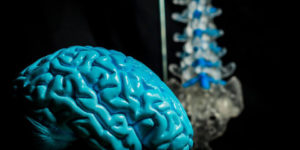
“The brain is the most important organ, according to the brain.”
Our brains control the function of every cell, organ and tissue in our body. It’s of no surprise to most that our health depends on our brain function. Improving brain function can lead to improving all facets of our health including our mood, immune system, balance, digestive issues, and even pain. The best part of all of this is how easy it can be to help improve your brain function and help lower your risk of having dis-ease and suboptimal health.
1.) Stay hydrated! Seriously. Drink more water! It is the #1 recommendation that I give to patients. I often say; “if staying hydrated doesn’t feel like work, then you probably aren’t drinking enough water!” An easy rule of thumb is to drink one half of your body weight in ounces. So if you weight 160 lbs. than you should drink 80 ounces a day. Don’t forget that caffeine, alcohol, and other diuretics actually dehydrate you more as well. Thanks to a nifty hormone known as ADH, when you consume diuretics you end up more dehydrated than you were before. Lack of water to the brain can cause numerous symptoms including problems with focus, memory, brain fatigue and brain fog, as well as headaches, sleep issues, anger, depression, and many more. So remember—stay hydrated!
2.) Get enough sleep. Researchers have found that our body also uses sleep to help flush out neurotoxins from the brain. Therefore, in addition to the weight gain, memory problems, inability to perform, depression, and increased cancer risk that comes from poor sleeping habits, it turns out that not getting enough sleep also allows neurotoxins to build up in your brain, especially one protein, beta-amyloid, that can further worsen sleep and is also linked to Alzheimer’s disease. So only getting 3 or 4 hours of sleep is not something to brag about–but a serious health issue! Researchers suggest that adults gets at least 7 hours of restful sleep a night, and also point out that kids often require more sleep as their bodies are growing much more than ours. So stop neglecting your bed!
3.) Get checked regularly by your Neurologically Based Chiropractor. Don’t have one? Stop.Right.Now. Go find one! It will change your life! Neurologically Based Chiropractors use technology to properly asses how your brain is functioning and the best way to improve it as well. Regular care has been shown to help how your brain allocates resources, improves brain function and improves your overall health. Research has also shown that going longer than 2-3 weeks without getting checked, can start to lead to maladaptive brain patterns and function. This is exactly why I recommend my patients continue getting care. Just like we don’t eat one healthy meal or go to the gym just once, maintaining optimal brain function is a continuous investment in our health. This is why Neurologically Based Chiropractors are so focused on improving your brain function. My patients report improved energy, less colds/flus, improved focus/clarity, reduction of pain, and an improvement in overall sense of well-being. A patient recently commented that “stress just rolls off me so easy now! I know my body is handling it well!”

Babies love getting adjusted!
Resources used throughout:
Daligadu J, Haavik H, Yielder PC, Baarbe J, Murphy B. Alterations in cortical and cerebellar motor processing in subclinical neck pain patients following spinal manipulation. J Manipulative Physiol Ther. 2013;36(8):527-37.
Boyle, P.A. et al. Much of late life cognitive decline is not due to common neurodegenerative pathologies. Ann. Neurol. 74, 478–489 (2013).
Buckner, R.L. et al. Molecular, structural, and functional characterization of Alzheimer’s disease: evidence for a relationship between default activity, amyloid, and memory. J. Neurosci. 25, 7709–7717 (2005).
Kuhn KW, Cambron J. Chiropractic management using a brain-based model of care for a 15-year-old adolescent boy with migraine headaches and behavioral and learning difficulties: a case report. J Chiropr Med. 2013;12(4):274-80.
Mormino, E.C. et al. Episodic memory loss is related to hippocampal-mediated beta-amyloid deposition in elderly subjects. Brain 132, 1310–1323 (2009).
Niazi IK, Türker KS, Flavel S, Kinget M, Duehr J, Haavik H. Changes in H-reflex and V-waves following spinal manipulation. Exp Brain Res. 2015;233(4):1165-73.
Northwestern University. “Chronic Pain Harms The Brain.” ScienceDaily. ScienceDaily, 6 February 2008.
Tang C, Zelenak C, Völkl J, et al. Hydration-sensitive gene expression in brain. Cell Physiol Biochem. 2011;27(6):757-68.
Trangmar S, Chiesa S, Kalsi K, Secher N, González-alonso J. Hydration and the human brain circulation and metabolism. Nutr Hosp. 2015;32(s02):10261.
Valle R, Aspromonte N, Milani L, et al. Optimizing fluid management in patients with acute decompensated heart failure (ADHF): the emerging role of combined measurement of body hydration status and brain natriuretic peptide (BNP) levels. Heart Fail Rev. 2011;16(6):519-29.
